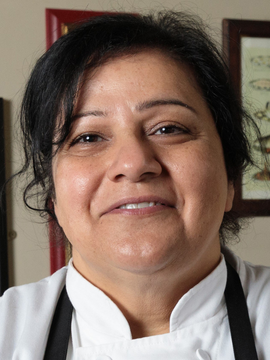Staff retention and happiness: How out-of-town restaurants lead the way
The current vacuum of hospitality talent is the inevitable aftershock of an industry plundered by Brexit and the pandemic.
It leaves us urgently asking: How do we create a workplace that keeps staff happy? What cultivates permanence in a notoriously transient industry? Harder still, how do you do it without a metropolitan talent pool at hand? I spoke to some of the UK’s top out-of-town chef-proprietors, old-timers and newcomers, each of whom deliver exceptional hospitality by leading their teams with compassion and integrity.
On the rugged shores of Loch Fyne sits the sugar-cube cottage of Inver, a restaurant with rooms that drew instant interest thanks to an early, glowing review from Marina O’Loughlin. The alchemy of the locally sourced Scottish produce, contemporary cooking, tranquil landscape and warm hospitality is enduringly popular. And this is in no small part thanks to the big-hearted stewardship of chef-owner Pam Brunton.
Brunton came up in the kitchens of London in the late 90s and early 2000s, some of which she recalls were “atrocious”. Although it was normal at the time, she remembers thinking “there’s got to be a better way of doing this”. She left the industry to work for food charities and campaign groups, one of which was Sustain: the alliance for better food and farming, where the strong female leadership of Kath Dalmeny and Jeanette Longfield exerted its influence. “They taught me more about management than I would ever have learnt in a kitchen,” she says. “They really put staff and staff wellbeing first.”
This has translated into a management style that is resonant of Simon Sinek’s ‘leaders eat last’ philosophy, where teams are inspired to pull together under a leader who puts those in their care first. Most weeks Brunton can be found mucking in for a pot wash shift whilst her partner Rob Latimer, who runs front of house, will do housekeeping shifts. “We do the same things as we ask our staff to do. I’ll be there cleaning down the kitchen at the end of the night. I’ll do the early start.” She and Latimer take less money from the business than any member of staff gets paid. “We’re building a business and see our financial recompense in the longer term,” she explains, “whereas staff need it in the short term”.
All employees are paid at least the living wage with tips on top. “We don’t do tronc,” says Brunton, “I think it’s dishonest and shouldn’t be government sanctioned.” Incredibly, wages for all roles are now almost £10k higher pro-rata than when Inver first opened in 2016. An attractive proposition, particularly given the low cost of living out in Strathlachlan. The next phase of Inver, once firefighting Covid is over, is to increase staffing to a level where Brunton and Latimer can rebalance their own hours. “For us to flourish and be the best possible managers we need to be able to back off of a bit,” says Brunton.
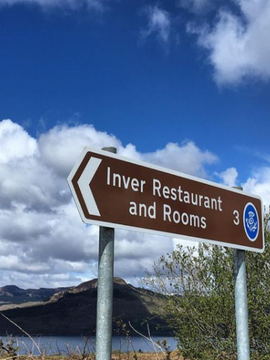
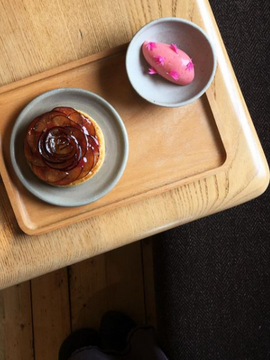
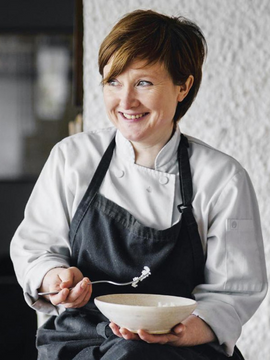
“The moment you have a young person working with you, you have to nurture them.”
At the Parkers Arms in the depths of rural Lancashire, Stosie Madi shares a similar approach to Brunton in leading her team from the front. “If the pot washer doesn’t come today, I’m not going to ask one of my chefs to do it,” she says. “I will go and do it myself. I’m not sitting in an office and watching it all happen, I’m there doing it.” The work is tough and Madi acknowledges her hours are usually double her staff members but she draws support from her close-knit team which is “very much a family.”
This supportive environment has created an excellent record of longevity in the team with staff tenures tallying three, four and even six years. One of Madi’s current kitchen assistants is into his fourth year at the Parkers Arms, having joined as a housekeeper. Once his English is sufficient to take the requisite health and safety exams, he will progress to chef status. “This is the sort of thing that kitchens should do,” says Madi. “The moment you have a young person working with you, you have to nurture them.”
At Inver, the supply of staff is helped by their popular staging scheme. It started as an ad hoc arrangement and in 2019 became a formal fixture of the restaurant’s culture. Brunton is a keen teacher and happy to welcome stagiaires without industry experience. “For me it’s quite a lot of extra management,” she says. “Because I genuinely want them to have a good experience, not come to scrub tatties whilst the employees do the real jobs. I want to make sure they’re getting what they want out of the experience, whether that’s learning to bake bread or fillet fish, we’ll try to do that with them.”
The time investment is sizeable but a useful cultivator of a network of Inver evangelists and future employees. She talks about the cases of beer and the thank you letters from stagiaires, some telling her how it’s changed their life. The current Inver kitchen team includes three stagiaires from 2020. “For me it’s great,” says Brunton, “because they know what they’re in for.” The scheme regularly welcomes lawyers, doctors and bankers. “They’re fascinated, they’re energetic, they want to be there and contribute. And they don’t come with any kind of industry baggage.”
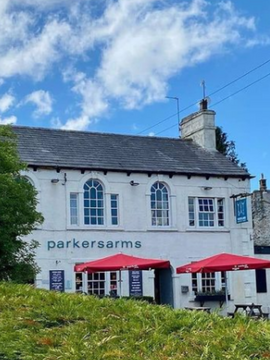
“I thought it was shocking how little people got paid in relation to the hours worked, but also the amount of responsibility they have."
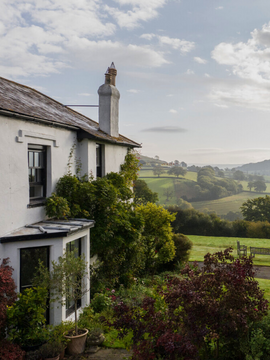
Heading south, down to the rolling hills of east Devon, Glebe House is a restaurant and guesthouse similar in style to an Italian agriturismo. It’s owned by chef Hugo Guest and his wife Olive who opened their doors to the public in May 2021. There’s plenty of allure for staff and guests in the bucolic beauty of the area but also the interestingly diverse nature of the operation. There’s a micro bakery, a charcuterie room, a 15-acre smallholding with livestock. They make their own sausages and bacon, even their own cheese.
Hugo Guest is not a hospitality veteran. After leaving behind a 10-year career in banking he headed into the kitchens of London’s restaurants to cut his teeth and was surprised by what he saw. “Walking into a kitchen environment, totally objectively, I was stunned at how bad certain things were,” he says. “I thought it was shocking how little people got paid in relation to the hours worked, but also the amount of responsibility they have.” He says his former career lent him perspective. “Having a different experience allows you to analyse that culture differently”.
He resolved that if he were to run his own place he would do things differently, with pay at the top of the agenda. They’ve been lucky to find a strong core team but how do you keep them around? “I figured the only way for us to be consistent as a new opening is to have a team that’s consistent and to do that you have to give them skin in the game.” By this he means all staff are remunerated with performance related pay or profit share in the business. “If you work hard and the business does well, then you do well,” he says. It seems to be going to plan so far. “I get the sense that everyone feels like they are part of something. I feel like there’s loyalty in the business.”
Another benefit for the staff at Glebe House is the education budget. If there’s a learning priority for a team member that’s going to be beneficial to the business, then money is allocated to fulfil it. Currently their front of house would like to take WSET level three, and the housekeeper is interested in learning beekeeping – both of which they’ll be able to do. In November they have a Japanese fermentation and koji expert coming to teach the team. “If you can develop that those skills and intellectual property within the business, you’ll be able to do things properly,” says Guest. He hopes once the business has bedded in, they may be able to replicate the kind of stage model as seen at Inver.
Back in Lancashire, Stosie Madi’s measure on the staffing crisis cites the unfair treatment of workers, with three clear causes. The first is the quest for perfection – at any cost – in Michelin-starred kitchens. “People have to sacrifice their sanity and health,” she says, “and if they don’t go along with it, they wouldn’t get employed in another Michelin establishment”. Though Madi has avoided this personally, having worked for the family business before starting out on her own at 23, her daughter has forged a successful front-of-house career at this end of the industry. “If people stop chasing Michelin stars and get on with running the business, they might find they enjoy the industry more anyway.”
The second culprit in Madi’s opinion is internal competition. “Hospitality businesses are so competitive with each other to keep prices down and gain customers that staff salaries are forfeited for the sake of company profit,” she says. The Parkers Arm’s has never participated in this race to the bottom. Since opening in 2007 she has defied expectations of how much a pie should cost – particularly in Lancashire – but it means she has been able to pay staff at least the minimum wage or living wage (dependent on age) with tips distributed on top. There’s an additional bonus when the business is doing well and, crucially, staff are paid for every hour they work. “The industry must give people a proper wage to turn it into a proper job, so they look to it as a career rather than a stopgap,” Madi says.
Building a robust business model for the Parkers Arms has meant constantly swimming against the tide. Long before it was commonplace to do so Madi pared down her pub menu to just a few options per course, managed bookings exclusively online, took credit card details and stipulated a minimum spend of £20 per head (equivalent to a main course). Today she takes a £20pp deposit 48 hours before a reservation which is debited to the bill. With reduced opening times they are now trading 40% down on pre-pandemic numbers but Madi is clear: “We will not put ourselves and our small team under any extra pressure. It isn’t worth it”.
These measures to protect her team and her bottom line speak to her third point, which is the unfeasible value expectation of the customer. “This isn’t a feudal society where hospitality are the plebs and the customer are the landed gentry,” she says. “We break our backs to make sure they get to sit down and get served, and they want to pay a pittance for it. So long as people keep compensating for the customer, this industry is never going to stand on its own two feet.” Madi’s mantra “if you don’t want to pay for it, then don’t bother coming” has not dampened their success. Bookings are already coming through for July next year.
A common thread that unites these three chef-owners is the value they recognise in talent, leadership and ideas from outside of the hospitality industry. It has informed the vital conviction that a hospitality business should be as commercially viable as any other; that fostering new talent and investing time to support staff creates a stable and motivated team. And perhaps most crucial of all, that paying a proper wage is non-negotiable, offering both financial stability and representing due respect for the job. These perspectives may not be the industry standard just yet but then that’s the point of pioneers.
A common thread that unites these three chef-owners is the value they recognise in talent, leadership and ideas from outside of the hospitality industry. It has informed the vital conviction that a hospitality business should be as commercially viable as any other; that fostering new talent and investing time to support staff creates a stable and motivated team. And perhaps most crucial of all, that paying a proper wage is non-negotiable, offering both financial stability and representing due respect for the job. These perspectives may not be the industry standard just yet but then that’s the point of pioneers.
